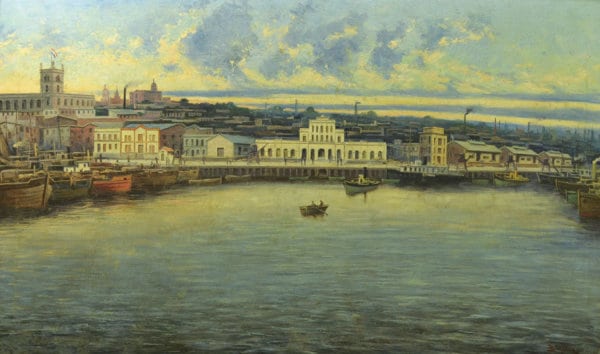Reflecting on the three years she spent there, Olga has written “Those were happy childhood days.” She enjoyed the warm climate, the sudden storms in the rainy season, the romantic and sentimental folk music on the harpa paraguaya, the abundant fruit trees and flowers, and she soon made friends among the neighbourhood children and with her classmates at Colegio Internacional. This was a private, co-educational American school which her mother had had the foresight to select for Olga, and the ingenuity to make a plea, in the form of an emotional appeal to its principal, for admission for her daughter. The effect of this plea was to lead to an offer of a bursary for elementary studies for her. At school, Olga enjoyed Spanish, drama, art, mathematics, and—crucially—began to learn English. She recalls her motivation as a child at the time: “to fit in, not to be too noticeable, but to safeguard my identity.” Fitting in was not easy, and at variance with the aim of maintaining a distinct cultural identity. She was reserved, observant and sensitive, apparently fatherless, had an exotic background and surname, and her long, braided hair, ending in stiff bows, always attracted attention. She was una Rusa; perhaps even, as some children insinuated, a Comunista? This she strenuously denied. “All I knew is that ‘Comunista’ was a bad word, overheard from adults, and I would object to the accusation with a determined ‘No! No! No!’ Eventually the name calling stopped, and I began to be included in the games at recess.” Full acceptance by pupils with British, German, Paraguayan and other backgrounds followed shortly thereafter. Her best friend was Marina, a Russian like herself.
In Paraguay, Olga developed self-consciousness, a deeper awareness of and interest in language and culture in general, a trait that was to help determine her professional life as an adult, and she achieved a greater degree of independence. This latter characteristic was due not only to schooling and the need for her mother to be away from home at work, but also to Babusya’s, (her grandmother Anna’s) decision to travel solo to the United States to join her son Yura in New York in January 1955. She was to find work as a housekeeper, a nanny, and an employee of a match company to support herself there. Her departure was heart-breaking for her granddaughter. “I missed her dreadfully and waited impatiently for her letters and parcels, and the day when I would be with her again,” said Olga, “She would remind me to keep doing my Russian grammar exercises and to read in Russian every day. She had noticed mistakes in my letters to her.” After her grandmother left, Olga remembers her Russian proficiency declined further without daily practice. She functioned in Spanish at school and at home playing with barefoot local Paraguayan street friends. She took a lively interest in the indigenous Guarani, outsiders like herself, who lived on the islands of the Parana River that ran through Asuncion. “The Guarani,” says Olga, “speak their own language, play their own music, and they then all wore colourful apparel made of feathers, leather, straw, and exquisite hand-woven cloth. They were not beggars, nor vicious thieves. They just took an occasional stroll through the city and ‘picked up’ a few items that perhaps were ‘not supposed’ to be there. This was done quite openly, and no-one interfered with it.”
It was in Asuncion that Olga had unexpected news of her father in the form of his first letter to the family, which arrived in February 1955, forwarded to Paraguay at his request by mutual friends in Poland who knew where the family was. Valentina had always venerated her husband’s memory. Yevgeni was “caring, affectionate, and warm-hearted,” Olga was told of the father she had never known. She had seen photographs of him, but he “seemed so distant,” the subject of furtive adult conversation half-comprehended by the child who overheard them. Even in Harbin, her mother had taught her to answer questions about his whereabouts by replying, “Father is having a rest at Stalin’s dacha.” Throughout her childhood, Olga had not felt sorry for herself for her fatherless state, but sorry for her mother, alone and vulnerable without a husband. She recalls praying for him at bedtime, but wondering who she should pray for—a living person or someone who has died, as “there is a difference in the choice of prayers.” It was heartening to know he was alive and cared about her, but soon she was to learn that Deda, Yevgeni’s father, who had left China with his wife for Tashkent in the Soviet Union in order to search for his son, had finally succeeded in locating him in spite of the otiose and obstructionist inefficiency of Soviet bureaucracy. Tragically, Deda had died in the process on a train trip before the planned reunion could take place. The selfless “walking doctor of Harbin” with his ubiquitous black bag, who had treated his own granddaughter, was never to see her or his son ever again.
TO BE CONTINUED – Part 2 : https://www.story-quilt.com/closing-the-circle-part-2/

Puerto de Asunción, 1940 (image from Wikipedia)





Nina Gorky4 years ago
Today I typed Olga Provatoroff into a Google Search. Imagine my surprise when I saw this recent story. Olga and I were friends at the University of Toronto and the last time I saw her was at her wedding. If you can please give her my email address and tell her that I would like to talk to her.
Nina Gorky
Peter Scotchmer4 years ago
Hi, Nina, How wonderful that you will be able to connect with each other through Story Quilt. I will contact Olga and let her know you are anxious to talk to her after so many years. This is not the first time I have been able to help re-establish contact like this via Story Quilt. Make sure you read Part 2 of Closing the Circle, published Sept.1st, 2021.
(https://www.story-quilt.com/closing-the-circle-part-2/)
Good luck!
Peter Scotchmer